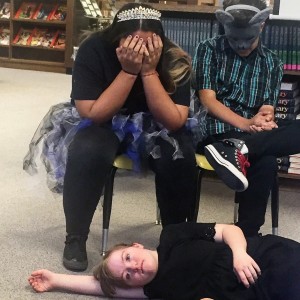by Amy Silverman
The reviews are in for this morning’s eighth grade production of “A Midsummer Night’s Dream,” or, as Sophie kept calling it all semester, “A Midnight Summer’s Dream.”
The production was nothing fancy, held in the library of the public middle school Sophie attends, during first hour drama class. Costumes were makeshift, sets pretty much didn’t exist; there was fidgeting, giggling, and a few forgotten lines. Later I’ll have to google to be reminded of the plot.
It was, without a doubt, the finest piece of theater I’ve ever seen.
Sophie played Hermia, a nice meaty role, and my favorite part of her performance was that she was no better or worse than her peers. They didn’t ignore or coddle her; she was simply another member of the cast. After the show, Sophie sat with some other cast members and ate donut holes and I remarked that they were really including her.
Well, for the moment anyway, Ray replied.
I’ll take it.
As we waited for the play to begin, I looked around and breathed in my favorite library smells, remembering that we’d sat in this same space almost three years ago to the day, gathered for Sophie’s middle school transition meeting. I was so nervous that day, with a list of questions. I worried about what lunch would look like, would Sophie be safe when she walked around campus, would she be able to keep up in science, math and English classes aimed at typical kids?
It didn’t occur to me to worry about whether or not Sophie would be included in a drama class. But, in fact, it was Sophie who noticed halfway through the first semester of sixth grade that only the kids in the gifted academy on campus got to take drama.
She begged for weeks, until the principal of the gifted academy emailed politely to ask me to get her to stop. That only got me started. I complained for years, up the ladder to the superintendent. They started a drama club on campus (Sophie joined but was not included). They started a drama class for the kids in the self-contained special ed program (Sophie is not part of that program).
But as the last semester of middle school approached, there was still no drama class for kids in the general population — not for a kid like Sophie, but equally important, not for the vast number of kids who land in the middle.
In the final days before the holiday break, I got word that there would be a drama class beginning in January. Did Sophie want to sign up?
Today’s production was the result of that. It was absolutely terrific. Clearly the kids had each been pushed in a good way — not just onto the stage but into their own heads, to understand a farce about love so similar to the real-life drama they deal with every day. Each learned a whole lot of lines, and when a line was forgotten they were respectful and helpful to their cast mates. Including Sophie, who reciprocated.
This morning as I dropped her off for the show, I wished her luck, told her not to be nervous, and we exchanged a peck on the lips. She started to walk away, and I stopped her.
“Hey Sophie, do you know who made this happen?” I asked, fully expecting her to say “ME!” — which is the truth, this was all her, as is everything Sophie’s made happen for herself at this school
“US!” she said, grinning.
Hey, I’ll take it. I hear that kids at Sophie’s school are already showing interest in taking drama next year.
Amy Silverman is a writer, editor, teacher and — most important — mother. Her daughter Sophie has Down syndrome. Sophie is 13 and fully mainstreamed in the eighth grade in a public school in Tempe, Arizona, where she lives with Amy, her father Ray and big sister Annabelle, 15. Sophie is a cheerleader — both at school and with Special Olympics. She also studies ballet and drama and has appeared in performances with Center Dance Ensemble and Detour Company Theatre.
For many years, Amy has explored what it means to have Down syndrome in the 21st Century on her blog, girlinapartyhat.com. Amy has also written about Sophie (and a lot of other things) for New Times, the alternative newsweekly in Phoenix, where she is managing editor. In addition, Amy’s a contributor to KJZZ, the National Public Radio affiliate in Phoenix, and her work has appeared on the radio show This American Life, in the New York Times, Washington Post, salon.com and many other places. She co-teaches the long running workshop Mothers Who Write and co-curates a live reading series, Bar Flies, both in Phoenix. Amy’s first book, “My Heart Can’t Even Believe It: A Story of Science, Love, and Down Syndrome,” was published in Spring 2016 by Woodbine House. To learn more, visit myheartcantevenbelieveit.com

